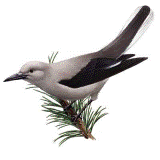Papers in the Biological Sciences
Document Type
Article
Date of this Version
1999
Abstract
The hypothesis that social learning is an adaptive specialization for social living predicts that social species should learn better socially than they do individually, but that nonsocial species should not exhibit a similar enhancement of performance under social learning conditions. The authors compared individual and social learning abilities in 2 corvid species: the highly social pinyon jay (Gymnorhinus cyanocephalus) and the less social Clark’s nutcracker (Nucifraga columbiana). The birds were tested on 2 different tasks under individual and social learning conditions. Half learned a motor task individually and a discrimination task socially; the other half learned the motor task socially and the discrimination task individually. Pinyon jays learned faster socially than they did individually, but nutcrackers performed equally well under both learning conditions. Results support the hypothesis that social learning is an adaptive specialization for social living in pinyon jays.



Comments
Published in Journal of Comparative Psychology 113:4 (1999), pp. 450-455; doi: 10.1037/0735-7036.113.4.450 Copyright © 1999 American Psychological Association. Used by permission. “This article may not exactly replicate the final version published in the APA journal. It is not the copy of record.” http://www.apa.org/journals/jcp/